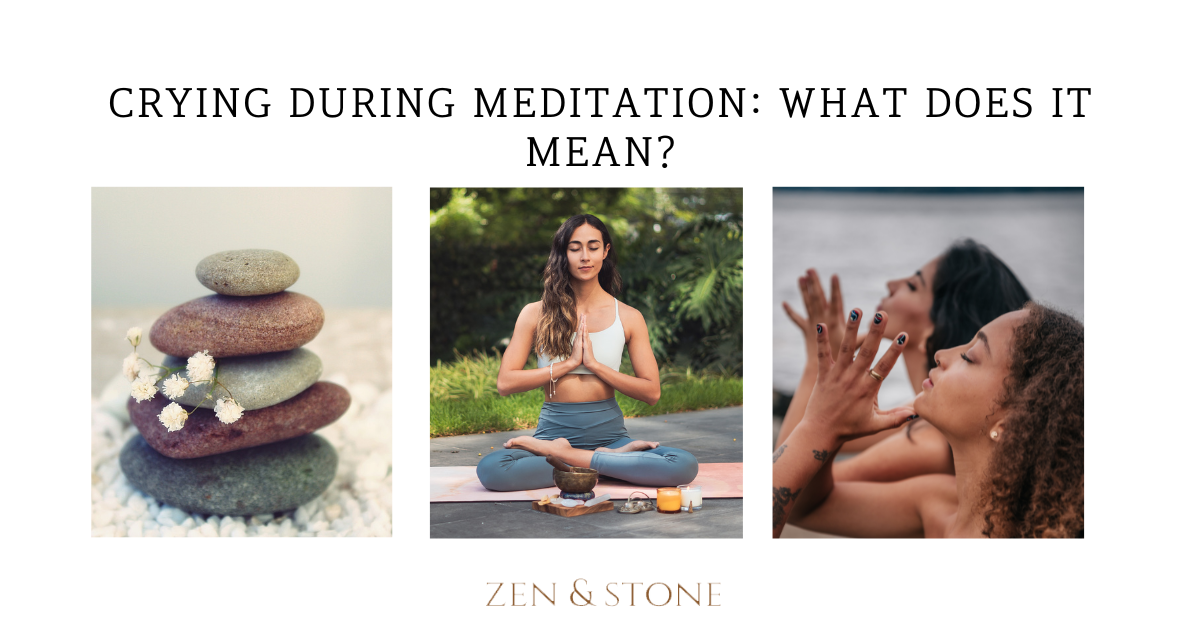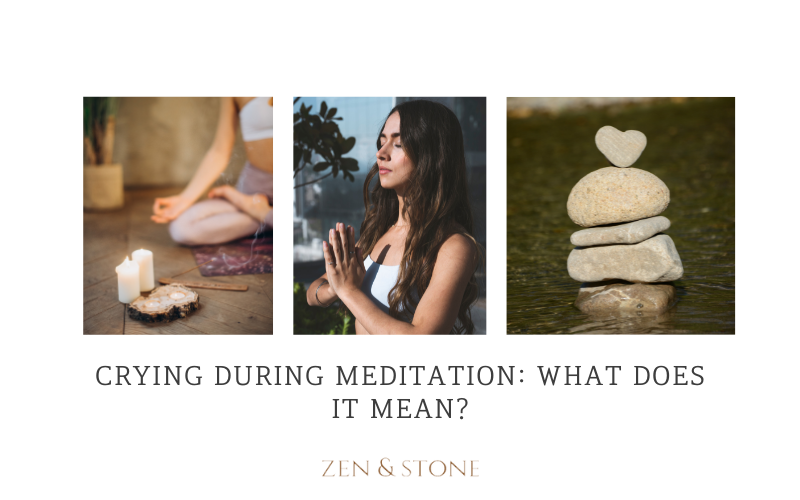
07 Sep Crying During Meditation: What Does It Mean?
From lower blood pressure, cardiovascular health, spiritual growth, and lower levels of stress, depression, and anxiety, we all know of the numerous wonderful benefits of meditation – but what about crying during meditation? Let’s take a look at exactly what it means.
In This Article
- Is It Normal To Cry During Meditation?
- Why Do I Cry During Meditation?
- How To Respond To Crying During Meditation
- Remember That Crying Is Good For You
- Stay Present
- Don’t Pass Judgment
- Let It Out
- Stop If It’s Too Much
- Reflect
- Find Other Ways To Express Your Emotions
- Ask For Help If You Need It
- Conclusion
Is It Normal To Cry During Meditation?
Although it can catch you off guard and throw you off balance, crying during meditation is not that strange. From being a little teary-eyed to full-on weeping, many people find themselves crying during meditation. Whether you’re new to it or a seasoned meditator, it can happen to anyone from time to time.
It’s generally nothing to worry about, and can actually be a sign that your meditation is working, especially if you’re meditating with a view to healing yourself. That said, it can feel overwhelming, so let’s break down what it can mean.
Why Do I Cry During Meditation?
Meditation practice puts us fully in touch with who we are and how we feel, so it’s no surprise that sometimes – it makes us cry! If you’ve been burying some negative emotions, it’s very common for them to purge out of you during or after a meditation session, especially if you’re meditating with a view to healing emotionally or spiritually.
It can also mean that you’re using the wrong breathing technique during your meditation; usually, breathing too fast and too shallow, because you are not patient enough. This can result in you feeling lightheaded, and even water-eyed. So, be sure to relax and breathe deeply and slowly.
However, it is not always a sign of emotional distress or poor breathing. It can also be a good thing; the release of positive emotions from the peace of meditation, the feeling of love from universal energy, or the profoundness of spiritual enlightenment. Again, if you’re doing healing meditation, it can also be a sign of self-compassion or your body’s way of releasing toxins from the energy system or physical body.
All of that said, if you’re reading this, then you’re most likely concerned about it, but there’s absolutely no need to be. As mentioned above, even when the tears have come from a negative emotion or memory, it’s good that you’re purging it out of your system. It’s better to release it and move on than keep it inside and wait for it to get worse!
How To Respond To Crying During Meditation
While crying is a normal response to meditation and can help to pave the way to inner peace, it can still feel overwhelming and a little strange if you’ve never experienced it before. To help you out, here are some top tips on how to respond to crying during meditation.
Remember That Crying Is Good For You
Crying is often thought of as a sign of weakness, especially in men, but while it may feel a little bit uncomfortable, it is not a bad thing. In fact, it’s a very common coping mechanism, and it’s a product of the body and mind working together to release stress – which is actually pretty cool.
It also lowers the levels of stress hormones such as cortisol in the body and allows you to release the negative energy inside of you, both emotionally and spiritually, so that it is no longer a part of you.
Holding onto tears, on the other hand, can have an adverse effect in the opposite direction; such as depression, anxiety, poor sleep quality, and a greater chance of illnesses like cardiovascular disease when allowed to build up over time.

Stay Present
Although it can catch you off guard and make you question whether or not meditation is right for you, crying does mean that it’s working, so if you’ve come this far – you might as well stick with it! Try taking deep breaths to get through it you’ll most likely come out the other side feeling much, much better.
It’s also a good idea to take notice of what’s happening inside your body as you cry. Are you feeling anything in your physical body? What do your tears feel like? Do you feel heavy, hot, cold, light, and emotional, does it feel good or bad? Remain present and consider what these things may mean.
Don’t Pass Judgment
A big part of meditation is observing your experience without judging them, so the same goes for the tears. Allowing yourself to get frustrated by your tears would just make the situation worse. Simply let your tears flow and give in to your faith; trust the process and everything that comes with it, just like you would in any other meditation session.
Let It Out
Meditation and spiritual journeys are all about getting to grips with who you are, of which your emotions are a huge piece, so feel free to just let it out and observe.
Stop If It’s Too Much
Although we want to encourage you to be comfortable with crying during meditation – if the tears are caused by something that feels frightening or too intense, especially if you’re new to meditation, it’s okay to stop it and try again another time. We all develop at our own pace, and as with anything, trial and error is a natural part of the process!
Reflect
Once it’s over, reflect on the experience, and consider how you feel in hindsight. Are you tired? Do you feel free? Lighter or heavier? Positive or negative? There are no wrong answers.
However, if it is negative, consider why, and think about what you can learn from the situation. It might be helpful to keep a record of these feelings in a journal, or with a trusted confidant. You should also consider practicing a little extra self-care afterward to lift your spirits back up.
Find Other Ways To Express Your Emotions
If you think you’re in need of finding other ways to express your emotions, especially if you have pent-up emotions or suppressed emotions, you should consider looking into various personal outlets like journalling, shadow work, and therapy, as well as creative outlets like painting and music, plus physical outlets like sports and exercise.
Ask For Help If You Need It
Whilst meditation is generally quite cleansing and beneficial, difficult emotions from past trauma and unresolved sadness can sometimes surface that are difficult to deal with on your own. If this is the case for you, consider seeking help if you need it.
Although it’s uncommon, retraumatization can sometimes occur after an attempt at deep healing meditation, especially in beginners. So, if you feel like this is happening to you, you should definitely seek some help to cope with your feelings by talking to a professional or loved one.
Conclusion
There are many reasons that meditation can result in crying, and it’s not always negative, but when it is, there’s no need to feel weird about it or give up on meditation. Remember to trust the process and that everything has a purpose – even crying!
